By Abiola Gbolahan
Edited By Fredrick Oladipupo
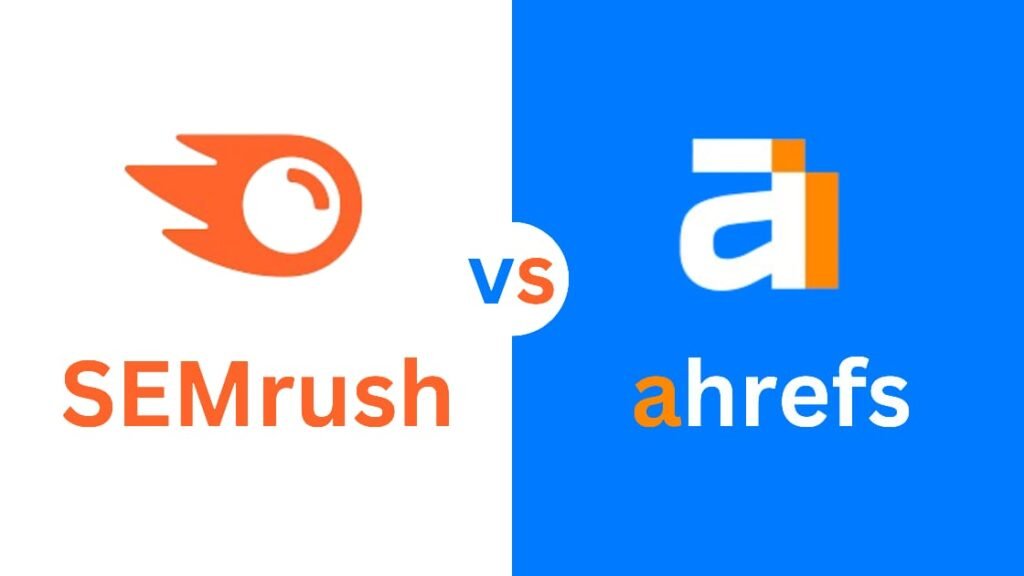
Table of Contents
Introduction
AI is changing the way businesses approach digital marketing and SEO. With search engines getting smarter and user behavior constantly evolving, marketers need advanced tools to stay ahead. AI-powered SEO tools help simplify research, improve content strategies, and provide deeper insights into search trends. Whether it’s generating keyword ideas, analyzing competitors, or automating reports, AI makes SEO more efficient and data-driven.
When it comes to SEO tools, SEMrush and Ahrefs are two of the biggest names in the industry. Both platforms have built strong reputations for their powerful keyword research, backlink analysis, and competitor tracking. Over time, they’ve integrated AI-driven features to enhance their capabilities, offering marketers smarter ways to optimize their strategies.
But which tool does a better job? SEMrush vs. Ahrefs AI—which one provides more valuable marketing insights? In this article, we’ll compare their AI-powered features, breaking down how they handle keyword research, competitor analysis, content recommendations, and automation. By the end, you’ll have a clear idea of which platform suits your SEO needs best.
2. Overview: SEMrush vs Ahrefs AI
When it comes to SEO and digital marketing, SEMrush and Ahrefs are two of the most trusted tools out there. Both platforms help businesses and marketers improve their online visibility by providing insights into keyword rankings, backlinks, competitor strategies, and overall website performance. Over the years, they’ve evolved to become more advanced, and with the rise of AI, they’ve integrated new features to make SEO easier and more effective.
2.1 SEMrush vs Ahrefs: Overview
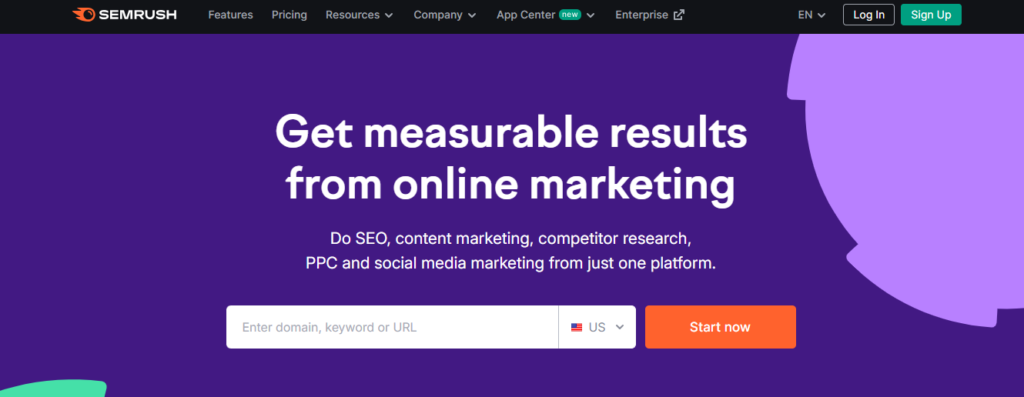
SEMrush started back in 2008 as a simple SEO tool focused on keyword research and competitive analysis. Since then, it has grown into an all-in-one marketing platform that covers SEO, PPC, content marketing, social media, and even competitive intelligence. It offers a massive database of keywords, detailed ranking reports, and advanced analytics, making it a go-to tool for businesses, agencies, and digital marketers.
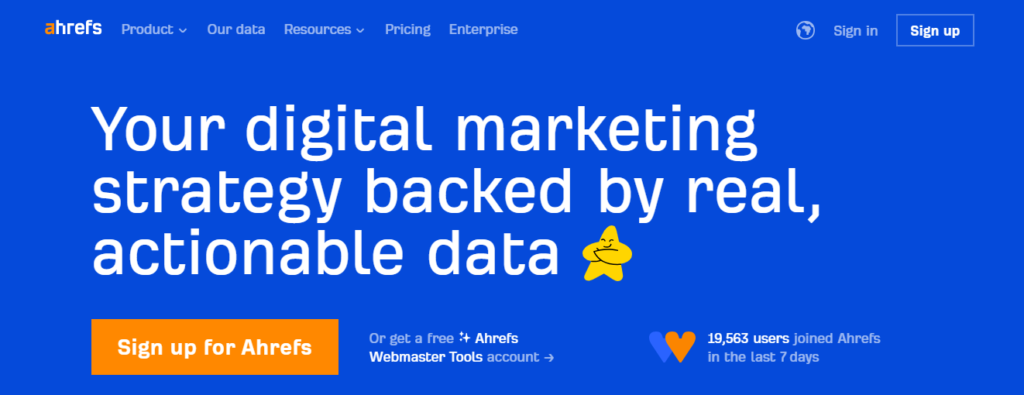
Ahrefs, on the other hand, was launched in 2010 as a backlink analysis tool. It quickly became one of the most trusted platforms for tracking backlinks, helping users understand how websites gain authority online. Over time, Ahrefs expanded its features to include keyword research, rank tracking, site audits, and content analysis, making it a favorite for SEO professionals who need in-depth data.
While SEMrush is often seen as an all-in-one digital marketing tool, Ahrefs is highly regarded for its precision and reliability in SEO-specific tasks like backlink tracking and keyword research.
2.2 How SEMrush and Ahrefs Have Integrated AI
As AI technology has advanced, both SEMrush and Ahrefs have adapted by integrating AI-driven features into their platforms. These AI-powered tools help marketers save time, automate repetitive tasks, and gain deeper insights into their SEO strategies.
SEMrush has introduced AI-driven keyword intent analysis, which helps users understand whether a keyword is informational, navigational, commercial, or transactional. This makes it easier to create content that aligns with what users are actually searching for. SEMrush also offers an SEO Writing Assistant, powered by AI, that provides real-time suggestions to optimize content for search engines. Additionally, its AI-powered competitor analysis gives businesses a clear picture of what their competitors are doing right and where they can gain an edge.
Ahrefs has also integrated AI into its platform, though in a more data-focused way. It uses machine learning algorithms to refine keyword difficulty scores and improve search volume estimations, making keyword research more accurate. Ahrefs also has an AI-powered content gap analysis tool, which helps users identify high-ranking content opportunities based on existing search trends. Its AI-driven site audit tool scans websites for SEO issues and provides actionable recommendations to improve rankings.
Both platforms are continuously improving their AI capabilities, making SEO easier and more data-driven. While SEMrush leans more towards AI-driven marketing and content optimization, Ahrefs focuses on using AI to enhance its core SEO functionalities.
3. AI-Driven SEO and Keyword Research
Keyword research is one of the most important aspects of SEO, and AI is making it smarter and more efficient. Both SEMrush and Ahrefs use AI to help marketers find the best keywords, understand search intent, and predict ranking difficulty. While both tools have strong keyword research features, they apply AI in different ways to improve accuracy and usability.
3.1 How SEMrush Uses AI for Keyword Suggestions and Intent Analysis
SEMrush has integrated AI into its Keyword Magic Tool and Keyword Overview features to provide better keyword recommendations. One of its standout AI-powered features is keyword intent analysis, which helps users understand what kind of content to create for a given search term.
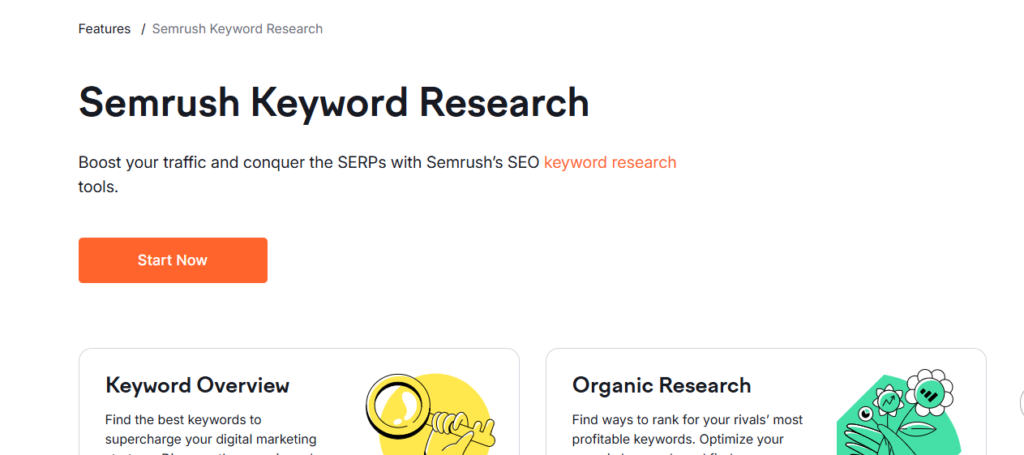
For example, SEMrush automatically categorizes keywords into informational, navigational, commercial, or transactional intent:
- Informational: Users are looking for general knowledge (e.g., “how to improve SEO”).
- Navigational: Users want to find a specific brand or website (e.g., “Ahrefs blog”).
- Commercial: Users are researching before making a decision (e.g., “SEMrush vs Ahrefs”).
- Transactional: Users are ready to take action, like making a purchase (e.g., “buy SEMrush subscription”).
This AI-driven intent analysis helps marketers align their content with user needs, improving their chances of ranking higher in search results.
Additionally, SEMrush uses AI-powered keyword clustering, which groups similar keywords together. This is useful for targeting multiple related search terms in one piece of content, making SEO efforts more strategic and efficient.
3.2 How Ahrefs Uses AI for Keyword Difficulty and Search Volume Estimation
Ahrefs has taken a different approach to AI in keyword research, focusing on accuracy and ranking predictions. Its Keyword Difficulty (KD) score is powered by AI and goes beyond just looking at backlinks. The tool analyzes multiple ranking factors, such as domain authority, content relevance, and user behavior, to give a more precise estimate of how hard it is to rank for a keyword.
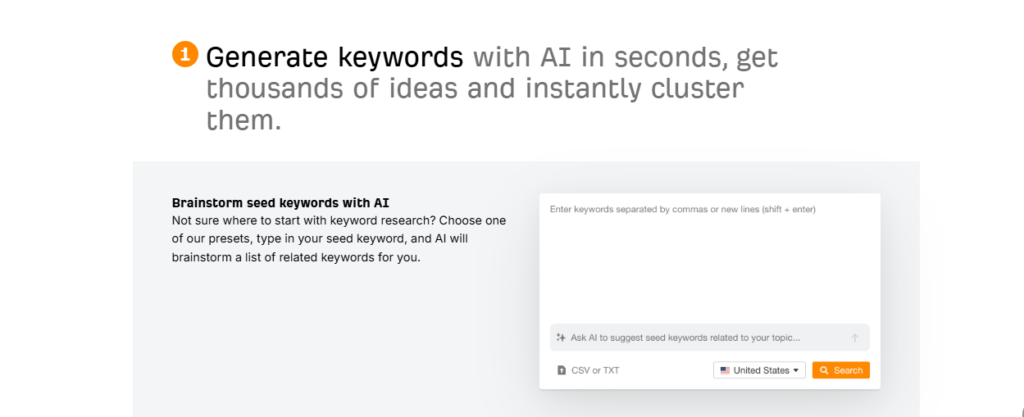
Another AI-driven feature in Ahrefs is its search volume estimation. Unlike some SEO tools that rely only on Google’s Keyword Planner, Ahrefs uses machine learning models to predict search volumes based on historical trends and real user data. This makes its estimates more reliable, especially for niche keywords.
Ahrefs also has an AI-powered “Parent Topic” feature, which helps users find broader keyword opportunities. Instead of just focusing on one keyword, Ahrefs groups related terms under a main topic, making it easier to create content that ranks for multiple keywords at once.
3.3 Which Platform Offers More Accurate AI Insights?
Both SEMrush and Ahrefs have powerful AI-driven keyword research tools, but they excel in different areas:
- SEMrush is better for keyword intent analysis and clustering, making it ideal for businesses that want to create content that matches user needs.
- Ahrefs is stronger in keyword difficulty and search volume accuracy, making it the better choice for SEO professionals who rely on precise data to plan their strategies.
If your focus is on understanding user intent and grouping related keywords, SEMrush is the better option. But if you want more accurate difficulty scores and search volume predictions, Ahrefs is the way to go.
4. AI in Competitor Analysis
Keeping an eye on your competitors is a key part of any successful digital marketing strategy. SEMrush vs Ahrefs ai offer AI-powered tools that make competitor analysis easier and more insightful, but they each take a slightly different approach.
4.1 SEMrush’s AI-Based Competitor Tracking and Insights
SEMrush has built a robust system for tracking competitors using AI. The platform’s tools dig deep into your rivals’ strategies by analyzing their organic search traffic, paid advertising, and content marketing efforts. For example, its Market Explorer feature uses AI to identify the top players in your industry and give you a detailed look at their traffic sources and audience behavior. This means you can see not just who your competitors are, but also how they attract and engage their audience.
Another useful tool is SEMrush’s Traffic Analytics, which estimates how many visitors a competitor’s website is getting and where that traffic is coming from. This information can help you pinpoint which channels are working best for your competition and inspire new strategies for your own marketing. Additionally, SEMrush’s AI-driven competitor keyword analysis shows you which keywords are giving your competitors an edge, highlighting potential gaps in your own approach.
4.2 Ahrefs’ AI-Powered Backlink and Domain Analysis
Ahrefs, on the other hand, is particularly known for its strength in backlink and domain analysis, and its use of AI enhances these capabilities significantly. One of Ahrefs’ standout features is its Backlink Profile Analysis, which uses AI to evaluate a site’s link-building strategy, domain authority, and even potential spam risks. With tools like the Link Intersect, Ahrefs can quickly identify where your competitors are getting their backlinks. This saves you time and provides clear, actionable ideas for your own link-building efforts.
Ahrefs also offers predictive insights by analyzing how backlinks might influence search rankings over time. Its AI-driven models take into account multiple factors, such as content relevance and domain strength, to help you understand which backlink opportunities could have the biggest impact on your SEO performance.
4.3 Which Tool Provides More Actionable Competitor Insights?
Both platforms deliver powerful insights, but they excel in different areas. SEMrush offers a broader view of the competitive landscape, giving you detailed data on traffic sources, user behavior, and keyword strategies. This makes it a great choice if you want an overall picture of how your competitors are performing and where you can potentially outmaneuver them.
On the other hand, Ahrefs is exceptional for those who want a deep dive into backlink analysis and domain authority. Its AI-powered tools provide very precise data on where competitors are earning their links and how these links affect their search rankings. If your main focus is on strengthening your link-building strategy, Ahrefs might be the more actionable tool.
5. SEMrush vs Ahrefs AI: Automation and AI-Powered Reports
AI-driven automation has made SEO much more efficient, allowing marketers to quickly analyze data and optimize websites without spending hours on manual tasks. Both SEMrush vs Ahrefs ai offer AI-powered tools for site audits, reports, and optimization suggestions, but they take slightly different approaches.
5.1 SEMrush’s Automated SEO Audits and AI-Generated Reports
SEMrush makes SEO audits simple with its AI-powered Site Audit tool. It scans your website for technical SEO issues—like broken links, slow-loading pages, and missing meta tags—then prioritizes them based on their impact on search rankings. The AI doesn’t just list problems; it also provides clear, actionable recommendations to fix them.
One of SEMrush’s biggest advantages is its automated reporting system. Instead of manually tracking keyword rankings, traffic trends, and competitor activity, SEMrush generates custom AI-driven reports that update in real time. This is especially useful for businesses managing multiple websites or marketing campaigns.
5.2 Ahrefs’ AI-Powered Site Audits and Optimization Suggestions
Ahrefs also offers an AI-enhanced Site Audit tool, but it takes a more technical approach. It scans websites for issues related to crawlability, site structure, and backlink health, helping users identify broken links, duplicate content, and internal linking gaps.
Where Ahrefs stands out is in its AI-powered backlink analysis. It doesn’t just check for bad links—it predicts how your backlink profile impacts your rankings and suggests ways to improve it. Ahrefs also provides content gap analysis, helping marketers identify missed keyword opportunities and areas where competitors are outranking them.
5.3 SEMrush vs Ahrefs AI: Which Platform Offers Better Automation for Digital Marketers?
- SEMrush is better if you need a complete SEO audit and automated reporting system. It’s ideal for marketers who want a detailed breakdown of their website’s performance without doing manual work.
- Ahrefs is a great choice for those focused on technical SEO and backlink optimization. It provides more in-depth AI-powered link analysis and advanced recommendations for improving domain authority.
6. AI-Powered Content Strategy and Recommendations

When it comes to content strategy, both SEMrush and Ahrefs leverage AI to help marketers improve their SEO efforts, but they do so in distinct ways. SEMrush focuses on content creation and optimization with tools like the SEO Writing Assistant, which analyzes readability, keyword usage, and tone to ensure content is well-optimized. It also offers a Topic Research tool, which suggests trending topics and commonly searched questions to help generate relevant content ideas.
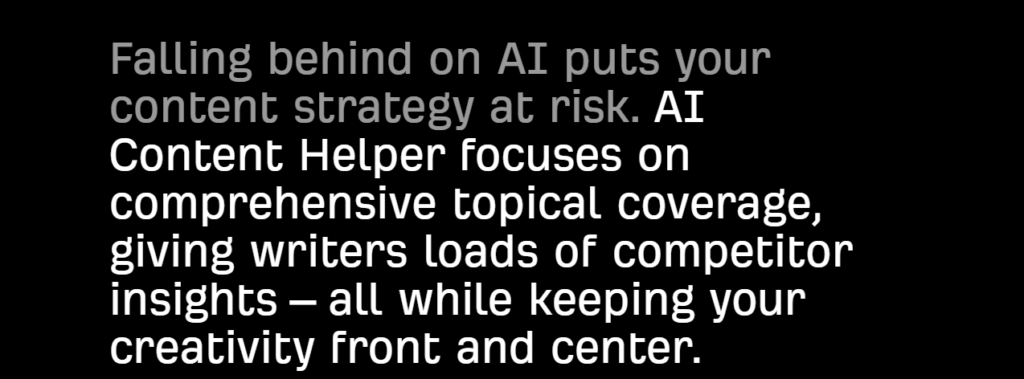
Ahrefs, on the other hand, takes a more analytical approach with its content gap analysis, identifying keywords and topics where competitors are ranking but you aren’t. Additionally, its AI-driven ranking predictions help users understand the difficulty of ranking for specific keywords before investing time in content creation.
If your goal is to streamline content writing and strategy, SEMrush is the better choice. However, if you want to focus on uncovering untapped keyword opportunities and ranking insights, Ahrefs offers more data-driven advantages.
7. User Experience and Ease of Use

Both SEMrush and Ahrefs offer powerful AI-driven SEO tools, but their user experience differs. SEMrush has a more intuitive and beginner-friendly interface, making it easier for users to navigate through features like AI-powered keyword suggestions and competitor analysis. The platform presents data in a clear, structured way, allowing marketers,especially beginners to quickly understand and act on insights.
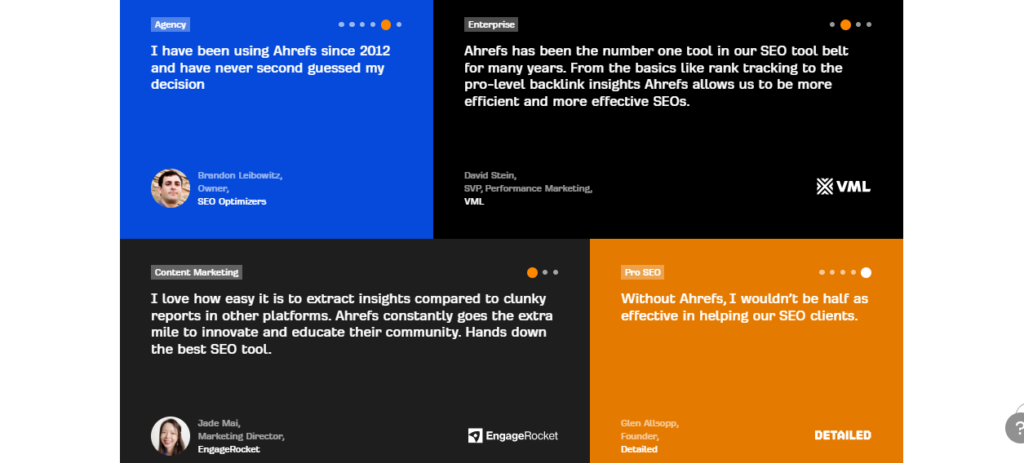
Ahrefs, on the other hand, is more data-heavy and technical, which can make it overwhelming for new users. While its AI tools provide deep SEO insights, the interface requires a steeper learning curve to fully utilize its capabilities. However, for experienced SEOs and data-driven marketers, Ahrefs’ detailed analytics and hands-on control make it a valuable tool.
If you’re looking for a smoother, more guided experience, SEMrush is the better choice, while Ahrefs is ideal for those who prefer in-depth data exploration and technical SEO analysis.
8. Pricing Plan: SEMrush vs Ahrefs AI
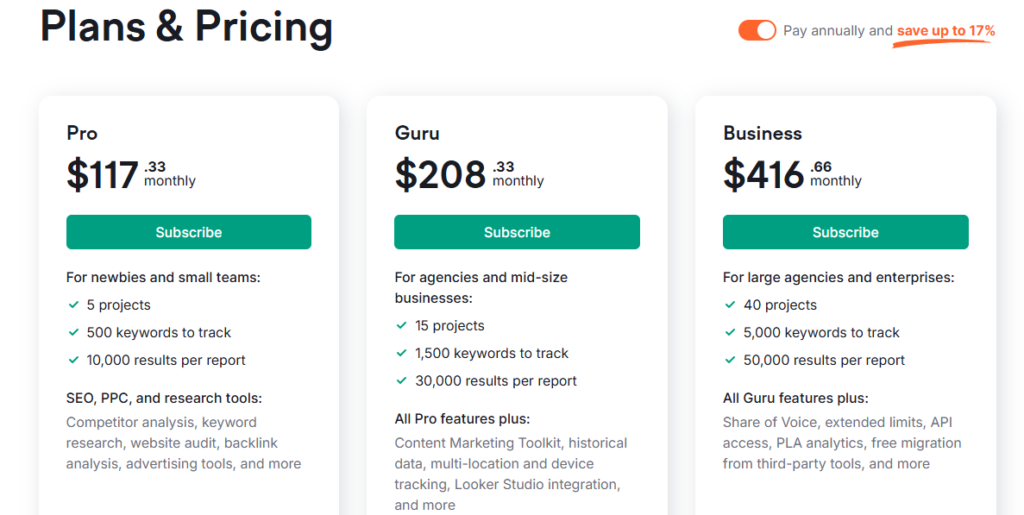
SEMrush offers three pricing plans—Pro, Guru, and Business—with both monthly and yearly billing options to suit different business needs. The Pro Plan, priced at $117.33 per month with yearly billing (saving 17%) or $139.95 per month with monthly billing, is perfect for small businesses or freelancers and includes essential tools like keyword research, competitor analysis, and backlink tracking. The Guru Plan, ideal for growing businesses, costs $208.33 per month with annual billing (saving 17%) or $249.95 per month with monthly billing, offering additional features like branded reports, historical data, and content marketing tools. The Business Plan, best for large enterprises or agencies, is priced at $416 per month with yearly billing (saving 17%) or $499.95 per month with monthly billing, and includes advanced tools such as API access, white-label reporting, and priority support. Annual billing offers significant savings, making SEMrush a cost-effective choice for businesses committed to long-term digital marketing success.
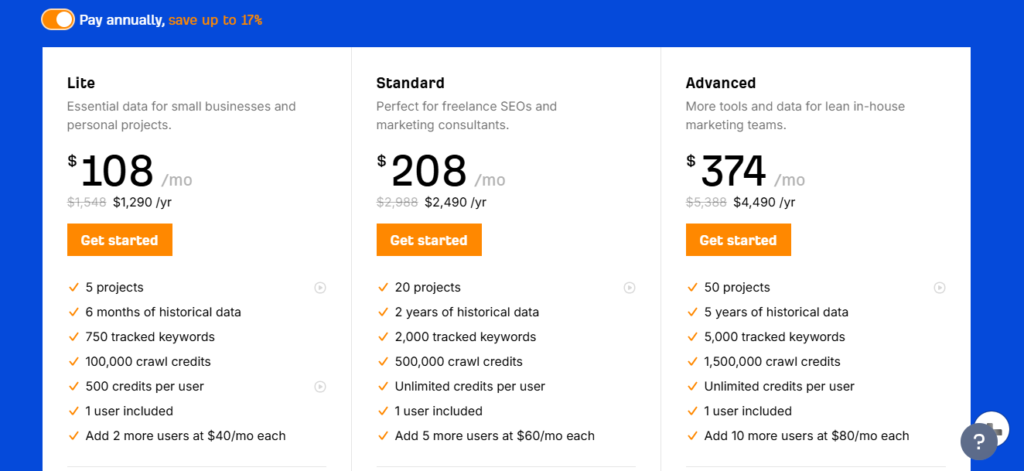
Ahrefs AI offers flexible pricing plans with both yearly and monthly billing options. The yearly plans also provide a 17% discount, with the Lite plan at $108/month, Standard at $208/month, and Advanced at $374/month. Monthly subscriptions are slightly higher, with the Lite plan at $129, Standard at $249, and Advanced at $449. For large-scale businesses, the Enterprise plan starts at $1,499/month, offering advanced customization and automation. Additionally, Ahrefs provides a Starter plan at $29/month for budget-conscious users and a free Webmaster Tool with limited access to Site Explorer and Site Audit for website owners.
9. Final Verdict: Which Platform Offers Better AI Marketing Insights?
Both SEMrush and Ahrefs are powerful tools, but they shine in different areas. SEMrush is the better choice if you’re looking for an all-in-one digital marketing platform. It offers AI-powered keyword research, content recommendations, and PPC tools, making it great for businesses that want a mix of SEO, paid ads, and content marketing. Ahrefs, on the other hand, is the go-to tool for deep SEO insights, especially when it comes to backlink analysis, site audits, and organic traffic research.
If you need a well-rounded marketing tool, SEMrush is the way to go. But if your focus is on SEO and link-building, Ahrefs delivers more detailed and accurate data. Ultimately, the best choice depends on your goals—SEMrush for versatility, Ahrefs for hardcore SEO analysis.
Related Reads:
- Notion vs Evernote: Which Productivity Tool is Best for You? – A deep dive into the strengths and weaknesses of two top productivity apps.
- ClickUp vs Monday.com: Which Project Management Tool Offers Better Value? – A detailed comparison of two leading project management platforms.
- Hootsuite vs Buffer: Which Social Media Management Tool is Best for 2025? – Examining features, pricing, and ease of use for social media marketers.
- Dynamic Yield vs Nosto: Which Personalization Tool Delivers Better Results? – Analyzing AI-driven personalization solutions for businesses.
- Freshchat vs Drift AI: Which Chatbot Platform Boosts Customer Engagement? – Comparing AI chatbots for real-time customer interactions.


